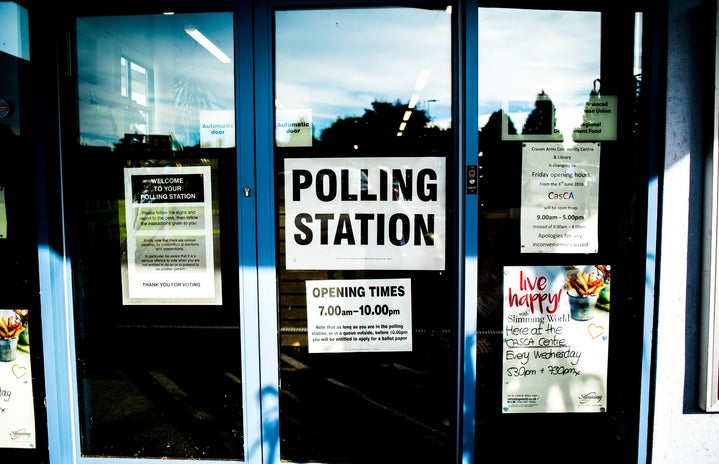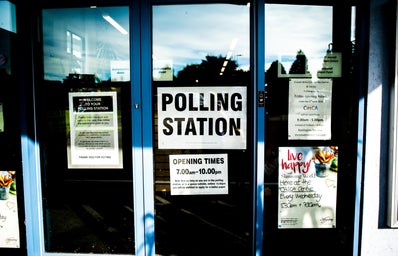Noah Goldstein is just a regular guy. He’s stressed out from his recent move, he replies late to emails (as do I), and his wife is in grad school. But this April, when he learned about the national poll worker shortage, he decided to do something about it. He and his friends founded The Poll Workers Project, an organization dedicated to recruiting people, particularly young people, to serve as poll workers.
Noah was inspired to recruit poll workers when he saw that during the Milwaukee primaries, the city went from 180 polling locations to five, due to a poll worker shortage caused by COVID-19. And those aren’t unique statistics. In Louisville, there was just one polling location, meant to serve more than 600,000 people, in a jurisdiction that is mostly people of color. Here in Atlanta, people had to wait in line for hours just to vote, with black voters waiting 8.5x longer than white voters to cast a ballot. As we know from the 2018 midterm elections, the disenfranchisement of people of color is a huge problem, one that continues to be exacerbated, not just by racist officials, gerrymandering, and a lack of allocated funds, but now by COVID related poll worker shortages as well.
People over the age of 60 are at the highest risk for severe complications from COVID-19. People over the age of 60 also make up most of the poll worker population. And even before the pandemic, two-thirds of jurisdictions reported trouble staffing all their locations. So you can understand why the nation is now facing an alarming lack of people willing to work the polls in November.
The Poll Workers Project aims to change that, by reaching young people where they are. In a virtual semester, the readers of Her Campus are scattered around the country, not necessarily concentrated in the cities they go to school in. Noah lives in Boston right now, but he doesn’t want to just send people from major cities to places where there are shortages. Poll workers must be registered to vote in the state (and sometimes county) where they live. The Project wants to recruit people from their own communities, to go and help out where they are. Every place needs poll workers right now.
Tuesday, September 1st was National Poll Worker Recruitment Day. Awareness about this issue has come a long way since April, with sign up pushes coming from MTV, the Obamas, the Lincoln Project, Comedy Central, and more. Unfortunately, awareness doesn’t always equal numbers. Tuesday’s nationwide goal was 250,000 sign ups, a goal that was exceeded by 100,000 people. In 2016, around one million poll workers were needed nationwide– a long way from 350,000. When we hear about an issue a lot, it can start to feel like you don’t need to sign up, because everyone else will. This is not the case. According to a recent call with the Philadelphia elections commissioner, Noah says that they’ve only recruited 4,000 workers out of a needed 9,000. More locally, Georgia needs 20,000 workers, and has only 10,000. In North Carolina, Orange County had a small surplus, whereas the county next door, Chatham county, had a deficit. Sometimes these workers can be shuffled around, and sometimes they can’t, making signing up in your own community even more important. Even if you think your county is good, sign up anyway. A cushion is always needed for those who get sick, change their mind, get a flat tire, or don’t show up for whatever reason.
In the past, one of the major barriers for potential poll workers is the sign up process. There’s lots of ways to sign up to register to vote, and is usually a fairly straightforward process. Signing up to work the polls isn’t quite the same. Most young people haven’t worked the polls before, and the process can be a little more complicated, requiring training and multiple phone conversations. And of course, in classic American fashion, election guidelines and websites are left up to states, and states often leave it up to counties, meaning the quality and navigation ease of election websites can vary wildly. Every county has different resources and different budgets. Fortunately, this year an organization called Power the Polls has made the sign-up process extremely simple– all you have to do is put in your name, email, phone number, and zip code. The site then shows you exactly how to sign up based on your location.
Because guess what. When there aren’t enough poll workers, polling places get shut down. The first to go are usually those in communities with a majority of people of color. And a lack of workers and polling locations means long lines at the ones that are open, again, disproportionately affecting people of color. Check out this tweet for a great graphic. Voting by mail is an option, but many people still prefer to vote in person, even in the age of COVID. They might not trust the post office (for good reason), they might not know how, or they just might not want to. Noah is willing to wait in line all day to vote, but he knows that that’s a privilege. Long lines means people are disenfranchised, period.
Voting is extraordinarily personal, is fundamental to the well-being of our democracy, and is a basic human right. Elections don’t just determine who becomes president. On the ballot are also Senate races, House races, and local positions that may ultimately affect your life more immediately and directly than the races that get the most publicity. No one should be able to take that right away, and it certainly shouldn’t be revoked by something as solvable as a long line. Yes, serving as a poll worker might be a long day, but at the end, you know you’ve done your part to keep democracy alive. Noah adds that “it’s inspiring to see people in your community involved to that extent with the political process, and involved despite obstacles.” And if you can’t serve as a poll worker (or if you can), tell a friend! Their community needs them as well.
Older people are most at risk from COVID-19, but young people aren’t exactly immune, though they do have lower mortality and infection rates. Ultimately, deciding whether or not to serve as a poll worker is a risk assessment young people have to make for themselves. But given that universal mail in voting isn’t a thing, somebody has to be at the polls. Now is the chance for young adults to step up and fill the gap that COVID-19 has created. Noah is also hopeful that this will be a chance for people to start a habit that lasts a lifetime. Once you see how easy and rewarding it is to work the polls, you’ll keep doing it, and be able to persuade your friends to sign up too. And it doesn’t hurt that poll workers in all 50 states get paid. In the Before Times (2016), the nation needed about a million poll workers to staff 120,000 locations, which works out to about eight people per location. If nothing else, Noah says, this is a chance to meet new people or hang out with friends.
Lots of people don’t vote because they think that just one vote won’t make a difference. By working as a poll worker, you can help hundreds if not thousands of people vote– more than enough to make a difference. Even if just 100 Agnes Scott students sign up, that’s 12 more locations staffed, and another 8,900 people that get to vote, at least. Don’t assume that someone else will sign up. “You want to help people vote,” says Noah. “You don’t want to wake up on November 4th and say, ‘I wish I had done more.’”
You can sign up to work the polls here.
You can follow the Poll Workers Project on Instagram, @thepollworkersproject, or on Twitter, @PollProject.


